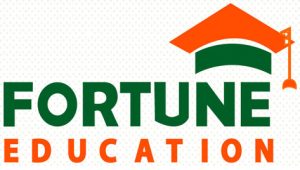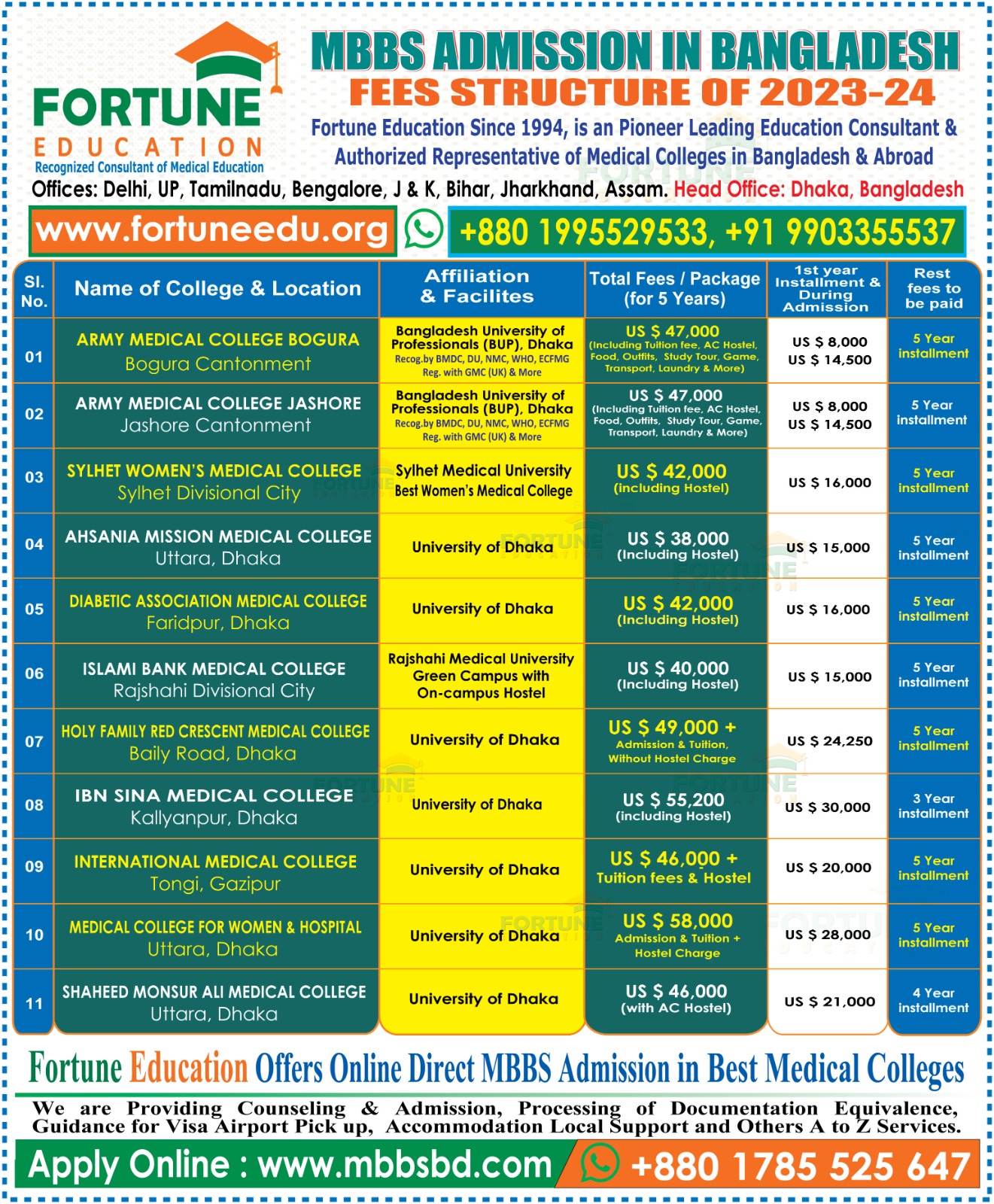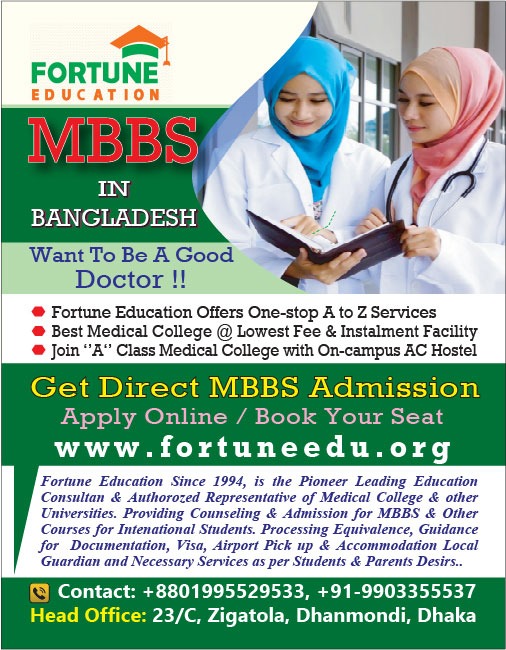Medical Education in Bangladesh
Here’s an overview of its key aspects:
Medical Education
Undergraduate Education:
Medical School for Doctors: Typically involves a Bachelor of Medicine, Bachelor of Surgery (MBBS) or Doctor of Medicine (MD) degree. This program usually lasts between 4 to 6 years, depending on the country and educational system.
Nursing and Other Health Professions: Programs such as Bachelor of Science in Nursing (BSN), physical therapy, and pharmacy also form part of medical education.
Curriculum:
The curriculum generally covers basic sciences (like anatomy, physiology, and biochemistry), clinical skills, and rotations in various medical specialties.
There’s a growing emphasis on interprofessional education, where students from various health disciplines learn together and understand each other’s roles.
Postgraduate Training:
After completing their undergraduate degree, medical graduates usually undergo residency or specialist training, which can range from 3 to 7 years, depending on the specialty.
This period involves hands-on patient care, typically in a hospital or clinical setting, under the supervision of senior doctors.
Licensing and Certification:
Graduates must pass licensing examinations to practice medicine. These exams vary by country, like the USMLE in the United States, PLAB in the UK, or the AMC exams in Australia.
For specialized fields, additional board or fellowship certifications may be required.
Continuing Medical Education (CME):
Healthcare is an ever-evolving field, and professionals must continually update their knowledge and skills. CME involves attending workshops, conferences, and additional courses throughout a healthcare professional’s career.
Challenges and Trends:
Globalization: There’s a growing trend of medical students training abroad, leading to a more diverse healthcare workforce.
Technology Integration: Use of technology such as telemedicine, digital health records, and simulation-based training is becoming more prevalent.
Patient-Centered Care: There’s an increasing focus on training healthcare professionals to provide holistic, patient-centered care.
Quality Assurance and Accreditation:
Medical programs and institutions are often subject to rigorous accreditation processes to ensure they meet specific standards of education and training.
Research and Development:
Research is a critical component, with medical education institutions often involved in groundbreaking medical and scientific research.
Medical education is crucial in preparing healthcare professionals to deliver high-quality care. It’s continually evolving to adapt to the changing needs of society, advancements in medical science, and the integration of new technologies and methodologies in healthcare delivery.
Army Medical Colleges in Bangladesh
Army Medical College Bogura and Army Medical College Jashore are two of the notable medical colleges in Bangladesh, offering medical education primarily to civilian students in addition to military personnel. Fortune Education, a prominent educational consultancy in Bangladesh, plays a role in facilitating admissions and providing guidance to students, especially those from overseas, seeking admission to these institutions. Here’s a closer look at each college and the role of Fortune Education:
Army Medical College Bogura
Location and Establishment: Situated in Bogura, it is one of the newer additions to the military-run medical colleges in Bangladesh.
Programs and Curriculum: Like other medical colleges in Bangladesh, it offers the MBBS program, following a curriculum approved by the Bangladesh Medical and Dental Council (BMDC).
Facilities and Training: Equipped with modern facilities, it provides a conducive learning environment with a focus on both theoretical knowledge and practical clinical skills.
Medical Colleges in Bangladesh
Medical education in Bangladesh, like in many countries, is a structured process that prepares students for a career in the medical field. Here are some key aspects of medical education in Bangladesh:
Entry Requirements and Admission Process:
Higher Secondary Certificate (HSC) Examination: Students must complete their Higher Secondary Certificate, particularly in the science stream with biology, to be eligible for medical studies.
Admission Test: Following the HSC, students need to pass a competitive admission test, which is a nationwide examination for entry into medical colleges.
Types of Institutions:
Public Medical Colleges: These are state-run and usually have lower tuition fees.
Private Medical Colleges: These are privately owned and generally have higher tuition fees than public institutions.
MBBS Program:
The standard medical degree in Bangladesh is the Bachelor of Medicine, Bachelor of Surgery (MBBS).
The MBBS program typically lasts for five years, followed by a one-year internship in a hospital.
Curriculum and Training:
The curriculum includes theoretical and practical components, covering various aspects of medicine such as anatomy, physiology, biochemistry, pharmacology, pathology, and clinical disciplines.
Practical training is a significant part of the curriculum, with students gaining hands-on experience in hospitals.
Postgraduate Education:
After completing the MBBS, doctors can pursue postgraduate studies, such as a Master of Surgery (MS) or Doctor of Medicine (MD), in various specialties.
There are also opportunities for research and specialization in fields like cardiology, neurology, or pediatrics.
Regulatory Bodies:
The Bangladesh Medical and Dental Council (BMDC) is the regulatory authority for medical practitioners and medical education in Bangladesh.
The BMDC is responsible for maintaining the standard of medical education, certifying doctors, and ensuring ethical medical practice.
Challenges and Developments:
Bangladesh faces challenges in medical education such as a shortage of faculty, limited resources, and the need to update the curriculum to keep pace with global medical advancements.
There are ongoing efforts to improve the quality of medical education and healthcare facilities in the country.
International Recognition:
The MBBS degree from Bangladesh is recognized in many countries, but graduates may need to pass additional licensing examinations to practice abroad.
Medical education in Bangladesh is evolving, with a focus on enhancing the quality of education and healthcare services. The country is also increasingly becoming a destination for international students, particularly from neighboring countries, due to the relatively affordable cost of education and living.
Medical Study in Bangladesh
Studying medicine in Bangladesh involves a structured educational pathway, primarily focusing on the MBBS (Bachelor of Medicine, Bachelor of Surgery) degree, which is the foundational medical degree in the country. Here are the key components and characteristics of medical study in Bangladesh:
Entry Requirements and Admission Process:
Academic Qualifications: Students must complete the Higher Secondary Certificate (HSC) examination, particularly in the science stream with biology, to be eligible for medical studies.
Medical College Admission Test: Admission to medical colleges is highly competitive and requires passing a nationwide entrance examination.
Duration and Structure of the MBBS Program:
The MBBS program in Bangladesh typically lasts for five years.
This is followed by a one-year internship or housemanship in a hospital, which is mandatory for practicing medicine.
Curriculum:
The curriculum includes basic medical sciences (like anatomy, physiology, biochemistry) in the initial years.
Clinical sciences (such as surgery, internal medicine, pediatrics, and obstetrics & gynecology) are introduced in the later years.
The curriculum is designed to provide a blend of theoretical knowledge and practical clinical skills.
Types of Medical Institutions:
Public Medical Colleges: Governed by the Ministry of Health and Family Welfare, these colleges offer education at a subsidized cost.
Private Medical Colleges: These are more expensive and cater to a different segment of students.
Regulatory Body:
The Bangladesh Medical and Dental Council (BMDC) is the regulatory authority for medical practitioners and medical education in Bangladesh.
The BMDC oversees the quality of medical education and accredits the MBBS degree.
Postgraduate Opportunities:
After completing the MBBS, graduates can specialize further through postgraduate degrees like the MD (Doctor of Medicine), MS (Master of Surgery), or diplomas in various specialties.
Challenges:
Medical education in Bangladesh faces challenges such as limited resources, the need for modernizing the curriculum, and ensuring the quality of education in private colleges.
International Recognition and Opportunities:
The MBBS degree from Bangladesh is recognized in many countries, but graduates may need to fulfill additional requirements (like licensing exams) to practice medicine abroad.
Research and Development:
Medical research is an integral part of medical education, though it’s more prominent at the postgraduate level.
Clinical Training:
Clinical training is a significant part of the curriculum, with students gaining hands-on experience in affiliated hospitals.
Studying medicine in Bangladesh offers a solid foundation for a career in healthcare, with opportunities for both local practice and international recognition. The emphasis on a mix of theoretical and practical education aims to prepare competent and skilled medical professionals.
Fortune Education
Role of Fortune Education for Medical Education in Bangladesh
Fortune Education, established in Dhaka, Bangladesh, plays a significant role in facilitating medical education, particularly for international students wishing to study medicine in Bangladesh. Here are some key aspects of the role played by Fortune Education:
MBBS Admission in Bangladesh
Admissions and Counseling:
Fortune Education primarily serves as an educational consultant, providing admission-related assistance to students, especially those from abroad, who are interested in pursuing medical education in Bangladesh.
They offer counseling services to help students choose the right medical colleges that match their preferences and qualifications.
Liaison Between Students and Medical Colleges:
The organization acts as a bridge between students and medical colleges, simplifying the admission process and helping with the documentation and enrollment procedures.
They maintain partnerships with various medical colleges, both public and private, which enables them to provide updated information and easier access for prospective students.
Guidance on Curriculum and Accreditation:
Fortune Education provides information on the MBBS curriculum, the accreditation of colleges, and the recognition of the MBBS degree from Bangladesh by different countries.
This guidance is crucial for international students who need to understand the equivalence and acceptance of their degree in their home country or elsewhere.
Assistance with Logistics and Accommodation:
For international students, they offer assistance with logistical aspects like visa processing, travel, and accommodation. This support is vital for students unfamiliar with Bangladesh and its systems.
Career Guidance and Support:
They may also provide career counseling to students regarding their future in medicine, including guidance on postgraduate studies and career pathways after completing the MBBS.
Promotion of Medical Education in Bangladesh:
By promoting the medical education opportunities in Bangladesh to international students, Fortune Education helps in enhancing the global reputation and reach of Bangladeshi medical colleges.
Ensuring Compliance with Regulations:
They ensure that the admission process complies with the regulations of the Bangladesh Medical and Dental Council (BMDC) and other relevant authorities.
It’s important to note that while organizations like Fortune Education play a supportive and facilitative role, students should also conduct their own research and due diligence when planning to study medicine in Bangladesh or any other country. This includes verifying the accreditation of the medical college, understanding the curriculum and local medical practices, and being aware of the cultural and linguistic aspects of studying in a foreign country.




